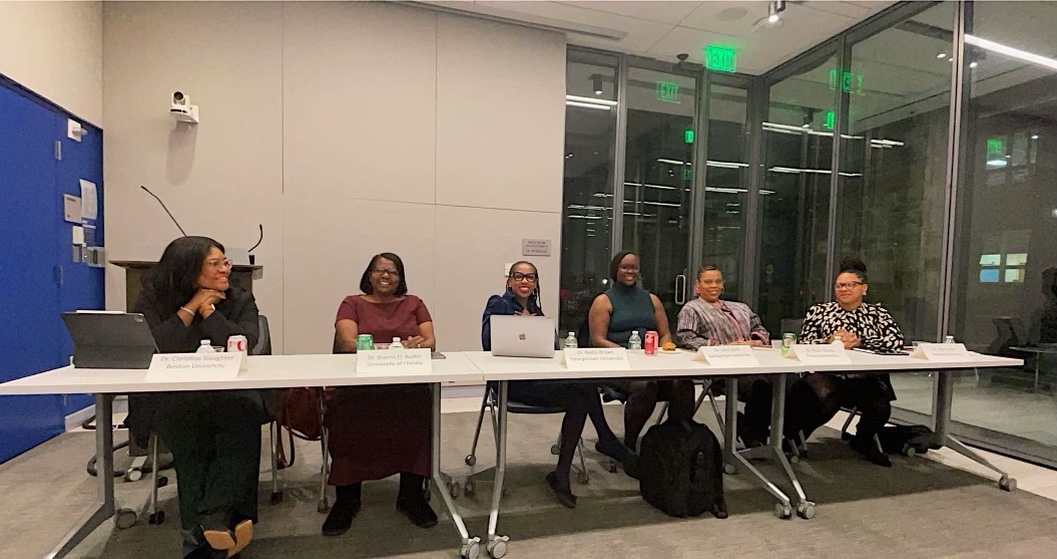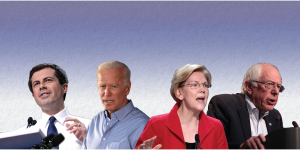In a panel on Feb. 5, Black female scholars from across the country came together to explore the power of Black women in American politics and their nuanced role as actors in the current political climate. The panel titled “Black Women’s Politics,” was hosted by the Women and Gender Studies, African American Studies, and Government departments to commemorate Black History Month.
The panel included Dr. Sharon Austin, professor of political science at the University of Florida; Dr. Ayana Best, assistant professor of political science at Howard University; Dr. Pearl Dowe, professor of political science and African American studies at Emory University; and Dr. Christine Slaughter, assistant professor of political science at Boston University. Alongside the five scholars, Dr. Nadia Brown, chair of the Women’s and Gender Studies department at Georgetown, moderated the discussion.
Brown began by prompting the scholars to discuss why research on Black women as a political force is necessary, asking, “What do we gain from centering this group of political actors?”
In answering the question, Austin reflected on the launch of her career as a scholar of Black women in politics in the 1990s and the opposition she received from other faculty at the University of Tennessee, Knoxville.
“I was told, ‘why are you trying to do that? That’s not important,’” Austin said. Opposition to her d stayed with Austin, yet as more Black women entered the political space, she felt that the need for her scholarship was becoming apparent.
“I thought about that especially when Joe Biden and Kamala Harris were being inaugurated, and now we have a Black vice president, we almost had a Black governor [in Florida], we’ve had several Black women running and also winning state-wide elections,” she said.
Even as more Black women run for office and win, legislation such as strict voting ID laws still disproportionately impacts Black voters’ ability to cast their ballot, jeopardizing voting rights for Black women. Still, Black women have been persistent in civic engagement, with more than two-thirds of Black women turning out to vote in the 2020 presidential election. Moreover, in the House of Representatives, 28 members are Black women, and 383 members of state legislatures nationwide are Black women, demonstrating major historical milestones in representation.
Like Austin, Best also discussed the challenges and opposition she faced while trying to demonstrate the value of studying the impact of Black women in the political sphere.
“The biggest question when I told people this was what I wanted to study was, ‘So who is your comparison group? You’re just talking about Black women — what about Black women to white women or Black women to Black men?’”
Best objected to research approaches that focus on the role and power of Black women in politics only in comparison to other racial demographics.
“We [Black women] are very diverse in our thinking, in our way of being, in our way of coming to think about politics and the way we fit in,” she said.
As the panel progressed, Brown shifted the discussion’s focus towards the future of Black women’s engagement with politics on a national — and local—level.
Scott highlighted how D.C.’s lack of statehood affects the ability of Black women to get involved in politics and represent their communities. She stated that conversations about how Black women can engage in politics differ in D.C. when the District has no representation itself.
With no senator representing D.C. Congresswoman Eleanor Norton, a Black woman, serves as the District’s representative in the House of Representatives. Norton, however, is a non-voting Delegate, meaning D.C. residents do not have a representative who can vote to confirm either Supreme Court justices, federal judges, or U.S. foreign ambassadors. At the same time, D.C. is a historically Black city, and the District’s population is currently 45% Black or African American, meaning that without statehood, Black voices specifically are underrepresented in Congress
With a lack of statehood limiting D.C.’s political power, Slaughter highlighted journalism as an alternative for Black women to engage with politics in the District. Recognizing the ability of journalism and news media to inform Black women and maintain civic engagement, she questioned where Black women are receiving political news coverage during the 2024 election season.
Slaughter also emphasized her concerns that misinformation targeted at communities of color can be a threat to the political involvement of Black communities. She highlighted the need for news outlets to incorporate Black perspectives in order to meet the needs of and maintain relatability with Black audiences. According to the Pew Research Center, Black journalists only account for 5% of the journalists who cover government and politics, while Black Americans represent 13% of the U.S. population.
The evening ended with a question and answer period, where a student asked about how young leaders can uplift Black women in politics. Dowe encouraged students to think about how their own engagement in government can support Black female politicians.
“I say to you as a citizen, you have to hold politicians accountable, but you also have to be engaged and support them in the work they have to do.”







